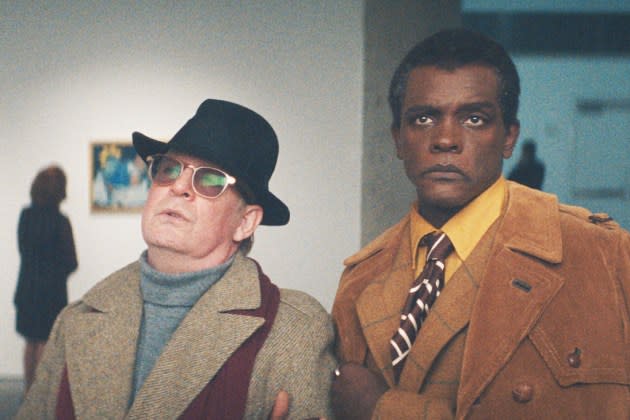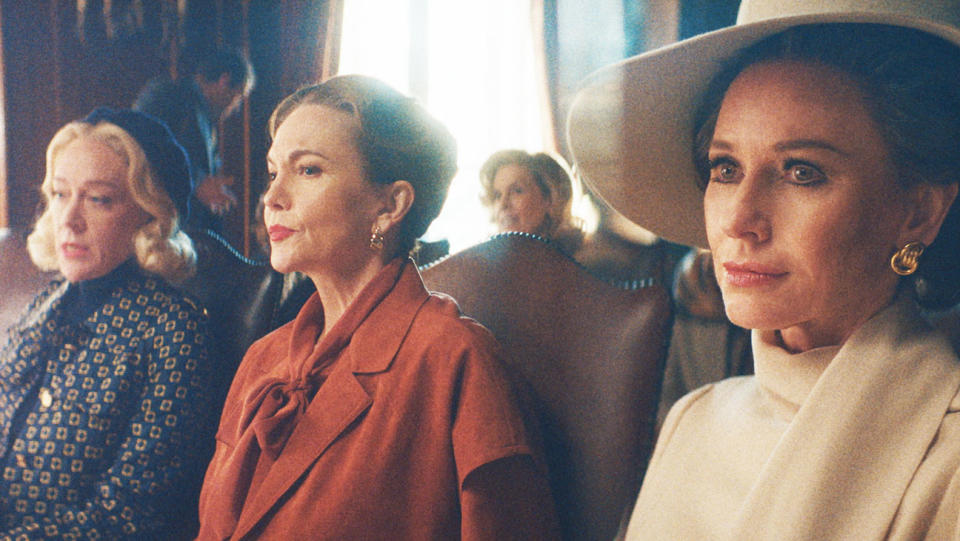‘Feud’ Bosses Explain Mid-Season Bottle Episode With James Baldwin and Truman Capote
- Oops!Something went wrong.Please try again later.

[This story contains spoilers from episode five of Feud: Capote vs. The Swans, “The Secret Inner Lives of Swans.”]
In a move that likely would’ve been met with disapproval by Truman Capote’s once-beloved “swans,” the wealthy socialite foes of the In Cold Blood author are decentralized in episode five of Feud: Capote vs. The Swans in favor of opening up dialogue about the position gay men were allowed to occupy in 1970s New York high society.
More from The Hollywood Reporter
The writers and executive producers of the second season in Ryan Murphy’s FX anthology use a fictionalized meeting between Capote (Tom Hollander) and writer and civil rights activist James Baldwin (Chris Chalk) as a vehicle to unearth the truth that, beyond feeling a sense of embarrassment from Capote exposing their deepest darkest secrets in a four-part essay series in Esquire magazine, the swans were also taken aback by Capote’s audacity to be anything more than their immortally loyal gay sidekick.
In the episode, Baldwin both empathizes with Capote’s downtrodden state while also encouraging him to take back his power and finish what he started — soberly — with the now-posthumously published novel Answered Prayers. By Chalk’s account, Baldwin was the perfect literary figure to insert into the idealized encounter.
“He was an advocate not just for Black people, but for queer people, for people being themselves and being safe,” the actor tells The Hollywood Reporter.
Baldwin also had his own swans of sorts to contend with as a Black gay man in America, ultimately choosing to relocate to Paris to escape racial and sexual prejudices.
“Everything that was James was not acceptable,” Chalk explains. “One of the reasons he was not such a centerpiece of the Black civil rights movement is because of his sexuality and his ‘isms’ that were perceived to not be super masculine.”
Exploring that larger societal context is what drew Chalk to this role. “One of the cool things about a lot of Ryan Murphy’s work is that he looks at all of the hate and the evil and decides, ‘I’m going to make something that looks directly at that and offers you a different perspective.’ He almost forces a different perspective on you, because you’ll be forced to deal with the humanity of these people,” he adds.
To that end, Murphy and his team made the decision to incorporate the fa-word into the series’ dialogue as a jarring depiction of how easily the swans, Ann Woodward (Demi Moore) and Lee Radziwill (Calista Flockhart) in particular, were able to substitute gay slurs for decorum when it suited their emotional state.
“We talked a lot about the use of those words, particularly the use of the word ‘f—’ and ‘f—ot,’ and how it was depicted in the show,” Murphy explained in a press conference ahead of the season, attended by THR. “Obviously, it’s a word none of us like, none of us use, and we had a lot of conversation about it, but it was so important to [Truman]. It was the thing that he claims that [Ann] did and also that Lee did to him that broke his heart and broke his soul, because he thought that was such a betrayal.
“So for us,” Murphy added, “as difficult as it was to articulate, it was about being true to the characters and the time and the power of words. We researched that quite heavily and we had a lot of conversations about, ‘Should we leave it in? Should we take it out?’ But ultimately, we did [leave it in]. And as a gay person who that word has been used about since I was 3 years old, I really understand the wound of it and the pain of it and how it really can turn your life upside down. So we decided to be honest.”
Below, director/executive producer Gus Van Sant and writer/executive producer Jon Robin Baitz explain further to THR what they set out to achieve with episode five of Feud: Capote vs. The Swans, and the sensitive, yet necessary, realities it explores.
***
What was the inspiration for this bottle episode centered on James Baldwin and Truman Capote?
JON ROBIN BAITZ Of course, it’s an imagined event. It’s a little play and I’m a playwright, and I love to do things that look at things from the side. I needed — and then everyone agreed — an observer with a great heart to come in and warn Truman, and attempt to rectify the situation he was in. I find James Baldwin to be an avatar of wisdom, and a life in poetry and a life in the heart. The exile part that he recommends, ultimately, was something that Baldwin did. He moved to Paris. He saw what the world was becoming. Had Truman been able to follow his advice, he might have lived another, what, 30 years? Baldwin’s wise and not invested in pettiness.
What do we know about the real relationship between Truman Capote and James Baldwin, and what kind of research informed how that episode was shaped?
BAITZ In Baldwin’s diaries there’s mention of crossing paths with Truman. They had a kind of ambivalent relationship. I think Baldwin was kinder because he was naturally kinder about Truman, but he was very much hurt by Truman. Truman dismissed Baldwin’s writing as second-rate, about which he was spectacularly wrong, and I think he was threatened by him.
There’s a lot of commentary in the episode about white women privilege and gay men being used as their accessories. Talk about opening up that conversation.
GUS VAN SANT There are wealthy white women — which the wealth brings privilege — for whom everything around them in their social world are things to be either acquired or used for their purposes. I think Truman is somebody who is intelligent and who can make them laugh, and can spin yarns that are beyond the truth a lot of times, which I think they loved. He was risqué and I think that was a fun friend for them to have.
BAITZ Also, these women are possessions in many cases. They are objects and their husbands would’ve been threatened by a straight dude hanging out with them. And so, unwittingly perhaps, to some extent, they know that they can adopt a gay mascot. It turns out to be about character, unfortunately, not about sexual preference.

Do you think there was a certain naiveté about these women that they thought Capote would never use their lives for his material gain?
BAITZ People lie to themselves and say things like, “Oh, yes, but it’ll never happen with to me. They love me too much. I love them too much,” and that becomes a kind of mantra, a delusion. I think it was Joan Didion who said, “Writers are always selling someone out.” They did get warned by Marella Agnelli, and she banned him from her life at a certain point.
VAN SANT Also, the type of writing that he was doing was the kind of thing that their social circle would read. He did disguise the names, but because the events were so specific that it was unmistakably them to their friends who mattered, that just was too much for them. I think they were also changeable enough that they didn’t have any trouble just dropping Truman. He was one of their many friends. It was sad, but he had to go.
BAITZ And in fact, I think it was shockingly painful and embarrassing to be exposed that way. And if you think about Truman, this is a man who wrote these soulful things, Breakfast at Tiffany’s is sort of mournful. Of course, In True Blood is about a universe that they weren’t a part of, but it’s so granular in its specificity, I think they could tell themselves a story. “Oh, Truman’s working on this great novel, which is about his life in some way.” And if you tell yourself that story, you can delude yourself into continuing the charade.
The f-word is said casually between Baldwin and Capote, but it’s also weaponized against Capote by some of the swans. Was there any hesitation about having that word in the series, why did you ultimately choose to use it?
BAITZ It’s peppered sort of deliberately in moments of exposure and intimacy in contrast to their public public personas. The swans let their hair down when they’re by themselves together. And I think that word in some ways still has a kind of pop of power sometimes, particularly in a show that’s about manners and modes and formality. But that was instinctive and, in real life, that’s sort of what happens when people are at home.
Why do you think Truman ultimately was never able to recover and finish his novel?
VAN SANT I personally think it was mostly his celebrity from In Cold Blood that elevated him to the point where he was hanging out with these socialites and spending his time doing that. He wasn’t really spending time writing. He wrote a little, but then he was, I think, partying and celebrating and it got out of control. The alcohol and the pills kept it so that the novel Answered Prayers wasn’t as clear to him anymore as maybe it once could have been.
BAITZ If I may add to that, I think self-loathing destroys your immune system. You crumble in bits and pieces. You can’t navigate and negotiate the desire to end, and so you do things to hasten the ending. You’ve lost something very important. You’ve told yourself a numbing story, which is: I’m a drowning man, and I’ll do anything to stay in the spotlight while I’m drowning, but I’ll numb myself to get through it.
The eight-episode limited series Feud: Capote vs. The Swans releases new episodes on FX Wednesdays at 10 p.m., streaming the following day on Hulu. Read THR‘s season coverage here.
Best of The Hollywood Reporter

